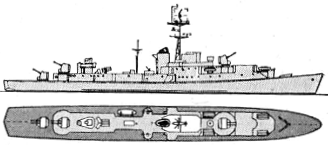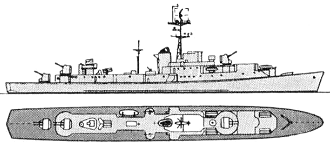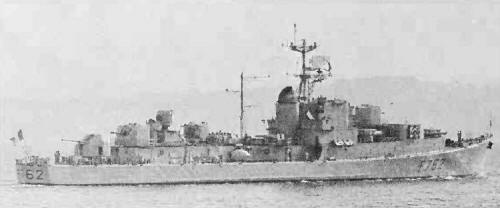

Le Corse 1960

Le Corse 1970
| Name | No | Yard No | Builder | Laid down | Launched | Comp | Fate |
| Le Corse | F761 | Arsenal de Lorient | 15.3.1952 | 5.8.1952 | 23.4.1955 | stricken 1.1975 | |
| Le Brestois | F762 | Arsenal de Lorient | 14.8.1952 | 16.12.1952 | 19.1.1956 | stricken 9.1975 | |
| Le Boulonnais | F763 | A C de la Loire, Nantes | 5.9.1952 | 12.5.1953 | 5.8.1955 | stricken 6.1976 | |
| Le Bordelais | F764 | F C de la Méditerranée, La Seyne | 30.1.1953 | 11.7.1953 | 7.4.1955 | stricken 6.1976 |
|
Displacement standard, t |
1250 |
|
Displacement full, t |
1702 |
|
Length, m |
95.1 pp 99.7 oa |
|
Breadth, m |
10.3 |
|
Draught, m |
4.30 |
|
No of shafts |
2 |
|
Machinery |
2 sets Rateau geared steam turbines, 2 Indret boilers |
|
Power, h. p. |
20000 |
|
Max speed, kts |
28 |
|
Fuel, t |
oil 292 |
| Endurance, nm(kts) | 4000(15) |
|
Armament |
3 x 2 - 57/60 Mod 1951, 2 x 1 - 20/70 Mk 4, 4 x 3 - 550 TT (24 K2/L3), 1 x 6 - 375 Bofors Mk 54 ASWRL, 2 DCT, 1 DCR |
| Electronic equipment | DRBV-20A, DRBC-30 radars, DUBV-1, DUBA-1 sonars |
|
Complement |
174 |
Project history: The E 50 class was designed to produce sea-going convoy escort vessels with a large radius of action. They were the first French ships to be built specifically for convoy escort. Although clearly influenced by the latest American thinking (they were of similar size to the contemporary Dealey class DEs, with which they shared an American-style flush-decked hull form with a transom stern), they were entirely of French design. Two were authorized under the 1949 Programme, and the second pair in 1950. The first three ships were financed under MDAP.
The original ASW armament comprised four triple banks of ASW torpedo rubes, all mounted forward at 01 deck level. Immediately abaft each bank was a ready-use locker carrying three more reloads, the torpedoes being transferred tail-first into the muzzle of the tubes. Initial drawings show a German-pattern single 105mm gun aft, with two of the new 57mm AA mountings in 'B' and 'X' positions. In the event, however, the 105mm was replaced by a third 57mm mounting for a homogeneous AA battery. There was a fire control position forward of the bridge with a director aft above the second mounting. As with the T 47 destroyers, initial drawings show a single tall lattice foremast on the British pattern, topped by a DRBV-20A air search radar, but a tall tripod with lattice support was eventually adopted. Le Bordelais was completed with a modified Strombos-Velensi funnel cap.
It was decided at a late stage to fit one of the new sextuple Bofors ASW RL, but the only position available - immediately forward of the DRBC-31 director - was not ideal because of its poor arcs fore and aft. This defect was corrected in the E 52 class.
The designed maximum speed was 26kts, but this was exceeded by an average of 3kts on trials. In convoy escort operations the E 50s were expected to maintain 14kts for maximum fuel economy.
Modernizations: early 1960s, Le Brestois: - 1 x 2 - 57/60(aft), 1 x 6 - 375 Bofors Mk 54 AWSRL, DRBV-20A radar; + 1 x 1 - 100/55 Mod 1964, DRBV-22A, DRBC-32A radars
1964, Le Corse, Le Boulonnais, Le Bordellais: - DRBV-20A radar; + DRBV-22A radar
Naval service: No significant events.

Le Brestois 1971 with 100mm gun
© Ivan Gogin, 2015